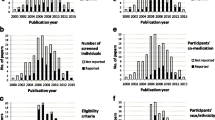Abstract
Parallel groups in a large, multicenter, phase III “pivotal” randomized clinical trial (RCT) with clinically relevant end-points are seen by the medical community as the “gold standard” of clinical research. However, there are limitations, some methodological and others political. The main one is the external validity of the method because a treatment, as studied in RCTs, does not necessarily reflect how it is used in clinical practice. Also, the method, as it stands, is not really predictive of the success in a particular patient of a certain intervention studied in a trial. To overcome these methodological drawbacks, different options have been implemented. The most important ones are: (1) the performance of pragmatic RCTs intended to address effectiveness rather than efficacy; (2) meta-analysis; and (3) the use of observational studies, with or without a comparison group. Recent experience has shown that type-A adverse drug reactions (ADRs) related to a specific class of drugs have been successfully characterized throughout cohort- or population-based case-control studies, whereas the evidence linking a specific drug entity to a type-B ADR, apparently severe enough to withdraw the drug from the market, has come mainly from case reports or case series. Other limitations of the RCT are more of a political nature. These large “pivotal” trials are mostly sponsored by the pharmaceutical industry, and to guarantee the scientific and ethical integrity of data produced, they are performed following standard operating procedures (SOPs) and good clinical practice (GCP) guidelines. Sometimes industry is not interested in sponsoring trials; thus, RCTs performed are in practice highly biased because of their potential economical profits. Furthermore, applying SOPs and GCPs is expensive and difficult to implement, and it is hard to find funding in public institutions. As a result, there is an urgent need to create a network of independent, skilled groups interested in sponsoring and performing institutional RCTs following “user friendly” GCP when the profits are low, but scientific interest high.
Similar content being viewed by others
Author information
Authors and Affiliations
Additional information
Received: 22 October 1999 / Accepted in revised form: 15 November 1999
Rights and permissions
About this article
Cite this article
Carné, X., Arnaiz, JA. Methodological and political issues in clinical pharmacology research by the year 2000. E J Clin Pharmacol 55, 781–785 (2000). https://doi.org/10.1007/s002280050697
Issue Date:
DOI: https://doi.org/10.1007/s002280050697




